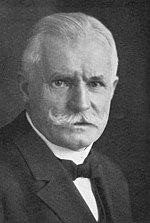Carl Dorno
Carl Dorno (born August 3, 1865 in Königsberg i. Pr. , † April 22, 1942 in Davos ) was a German naturalist. He is considered the founder of radiation climatology.
Life
Dorno studied economics and law at the Albertus University after completing a commercial training and temporarily taking over his father's department store in Königsberg . In 1884 he became a member of the Corps Hansea Königsberg . In 1891 he took over his father's trading house. In 1899 he began to study natural sciences in Halle and Königsberg. 1904 doctorate he in Königsberg to Dr. phil. (Chemistry).
In the same year he went with his tuberculosis daughter to the Swiss mountain health resort of Davos , where he also tried to find the cause of its heralded healing powers. On the roof of his house, he set up a meteorological station, from which the Physikalisch-Meteorologische Observatorium Davos (PMOD) emerged in 1907 , which Dorno directed until 1921.
His publication Study on Light and Air in the High Mountains (Braunschweig 1911) established the radiation climatology. He saw the combination of stimulating influences to strengthen the sick body and protective factors that protect the body from excessive climatic demands as the cause of the healing effect of the high mountain climate. He introduced the term cooling quantity and developed the frigorimeter with Rudolf Thilenius . Dorno also studied intensively the biological effects of ultraviolet radiation . The biologically active UV-B radiation was named after him Dorno radiation .
He published works on three particularly important types of climate: the alpine high altitude climate between 1500 and 2500 m, the extremely dry desert climate and the mild, sunny climate on the southern side of the Alps (Switzerland) .
The German inflation from 1914 to 1923 deprived him of his wealth in Germany, so that in 1922 he had to affiliate the PMOD with the newly founded Institute for High Mountain Physiology and Tuberculosis Research. When he resigned in 1926, the observatory was completely incorporated into the foundation.
In 1938 he was with his wife for the last time in Königsberg, where he had a house on Oberteich . After her death in October 1941, completely blind, he put an end to his life.
honors and awards
- Honorary Professor (Prussian Government, 1917)
- Silver Leibniz Medal (1919)
- Dr. med. hc from the University of Basel (1922)
- Admission to the German Academy of Sciences Leopoldina (1925)
- Honorary citizen of Davos
literature
- Walter Mörikofer: Dorno, Carl Wilhelm Max. In: New German Biography (NDB). Volume 4, Duncker & Humblot, Berlin 1959, ISBN 3-428-00185-0 , p. 80 f. ( Digitized version ).
Web links
- Literature by and about Carl Dorno in the catalog of the German National Library
- World radiation center Davos
- For his 70th birthday (the natural sciences)
- THE MIRROR (2007)
Individual evidence
- ↑ Kösener Corpslisten 1960, 85 , 98
- ↑ today: Swiss Research Institute for High Mountain Climates and Medicine
- ↑ According to Kempa's newsletter, "a benevolent fate redeemed him from an even longer infirmity"
- ^ Member entry by Karl Dorno at the German Academy of Natural Scientists Leopoldina , accessed on November 13, 2015.
- ↑ Hans Kempa: Encounters with corps brothers outside of East Prussia . Circular letter from the old rulers of the Corps Hansea Königsberg. Munich, February 1964
| personal data | |
|---|---|
| SURNAME | Dorno, Carl |
| BRIEF DESCRIPTION | German naturalist |
| DATE OF BIRTH | August 3, 1865 |
| PLACE OF BIRTH | Königsberg (Prussia) |
| DATE OF DEATH | April 22, 1942 |
| Place of death | Davos |
